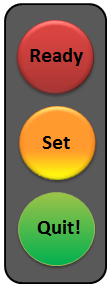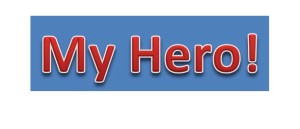Tag: metaphors
As the saying goes…
There will always be something to dislike about your job. Long commute, irritating coworkers, or uncomfortable office space – or worse – harassment, discrimination, or other illegal activities.
But there’s a difference between “the grass is always greener on the other side” and “pick your poison.” Fantasizing about how much better a new job would be is fine for escapism.
When you’re actually seeking a new employer, you know there will be something you don’t like about it. What do you expect it is? If you’re leaving behind a workplace with a culture of verbal abuse for one where there’s no cafeteria, then pack a lunch.
But if you have a reason to believe the workplace doesn’t align with your values, trust your instinct. A woman I know sat through interviews with a manager who jokingly disparaged her gender and ethnicity. She took the job anyway because she wanted to leave the negative work environment at her previous job. No surprise that the new manager continued to say terrible things to her.
“Out of the frying pan and into the fire.”
I know…the sayings are terrible but the point is worth making.
Not that stuck
 I was stuck in stop-and-go traffic for almost hour this evening. I would rather have been home already, or at least driving at a steady speed, but wasn’t really annoyed. I was on the fastest route and there was nothing I could do to make traffic move more quickly.
I was stuck in stop-and-go traffic for almost hour this evening. I would rather have been home already, or at least driving at a steady speed, but wasn’t really annoyed. I was on the fastest route and there was nothing I could do to make traffic move more quickly.
It made me think it’s a good metaphor for when we feel stuck at our jobs. We can listen to traffic reports to get information about what’s ahead. We can search for alternate routes to get to our destination. We can get off at the next exit and wait it out. Or, we can stay in our lane and inch along with the rest of the vehicles.
None of those choices are right or wrong, but they are choices. Even when we’re stuck in traffic, we have some control over our path forward.
Look Two Lanes Over

You know when you’re driving on a multi-lane freeway and you want to change lanes? Every once in a while when you’re moving into a center lane, someone on the far side of it wants to enter that lane, too. Hopefully both of you aren’t just looking to see if the center lane is clear, but also checking the lane on the other side of it for this very reason.
This analogy is great for a lot of work problems, too.
For example, if a coworker is being a jerk and it is impacting your project, what’s on the other side of his lane? Is he insecure about his standing in the team, or having a personal problem? If you can see both the bad behavior and what’s contributing to it, it might help you figure out better tactics to deal with it. Better than ramming him out of your lane, anyway!
Another time at work when it is critical to look two lanes over is when you’re applying for a new role. Your immediate supervisor might be the kindest, most supportive champion you’ve ever reported to, but that can come to a screeching halt in an instant.
Your great manager may quit: I know many people who took interesting jobs reporting to wonderful managers only to have those managers quit within weeks. Then the new managers didn’t like the staff that they inherited and/or completely changed their staff’s responsibilities.
Even if your great new manager stays, if the person they report to isn’t a fan of your work you are in a precarious position. As much as possible, find out what your potential manager’s manager is like. Ask questions during the interview about how long that person has been in the role, what their style is, and how involved they are in the team’s projects.
To avoid catastrophes, look where you’re going. Then look past where you’re going to see if the road is clear.
Visual Clutter Leads to Mental Clutter
 Or the title that I prefer: My sock drawer is good for business.
Or the title that I prefer: My sock drawer is good for business.
I work best in an environment that is tidy and minimalist. When there is clutter or too much artwork in my line of sight, I get distracted more easily and feel like there’s less blank space in my mind to have fresh ideas. When I work at my desk at home, all I see over the top of my computer are white closet doors.
What I recently learned is that tidiness inside those closet doors makes a difference, too.
I’m a fan of Marie Kondo, who has been making the press circuits with her new book Spark Joy, which is a follow up to her first book, The Life-Changing Magic of Tidying Up. I haven’t read either one.
Yep, I’m a fan based on what I’ve heard and read about her methods in the press. I’m not sure I need to read them because I’m already tidy, I despise over-consumption, and I have a personal principle for deciding what to own: I must love it, need it, or use it.
Also, Kondo’s tip that made a big impact in my life is pretty simple. Basically, it is to stand each piece of clothing or towel upright in a single layer instead of stacking them. This is accomplished either by rolling items, like making little sock spirals, or by folding things like shirts and jeans into compact squares and rectangles.
If at this point you are rolling your eyes and about to stop reading, just try it and see what happens!
It takes so little effort. Really. I took all my pajamas out of a drawer, refolded them and put them back in less than 5 minutes. If you do it and don’t like it, no big deal.

So in control of her life
But maybe you’ll find that it saves you time because you can immediately see the piece of clothing that you want, and don’t have to search for it in the middle of a messy stack. I used to refold and restack my t-shirts every month or so, and I’m glad not to do that anymore.
Depending on your shelves, you might also appreciate saving space. My t-shirts and tank tops used to take up twice the room they do now. Creating blank spaces frees up room for new, better things. Or in my case, I strive to keep an empty shelf or drawer in every room.
I may be unique in this way, but I actually feel happy every time I open a dresser drawer and see how neat it is. Little doses of uplifting energy like this keep me in a positive frame of mind, which is good for creativity. And for, you know – being around people I work with!
There may be metaphors involved here. What if your living space mirrors your life? Then a tidy desk and closet are helping to keep your exterior life and interior life clean.
There are so many things in life that we don’t have control over. I appreciate that I can control my dresser drawers. If anyone looked at the drawer where I store my athletic clothes, they would think, “Dang! That girl has her life in CONTROL.”
These may seem like small changes, but they add up to a more constructive, positive way of going about my day. In the same way that I work better with a lot of blank space around me, I feel better with tidy closets that will stay tidy because of the way that they are arranged. It creates ease and simplicity, and that frees up my mind to concentrate on more important business decisions while I’m working.

Tank tops before

Tank tops after
The Hero’s Journey at Work
 If you’re a reader or writer or fan of Joseph Campbell, you already know about the Hero’s Journey. Or, if you pay attention to movies like The Hobbit, you already know the story arc. It goes something like this:
If you’re a reader or writer or fan of Joseph Campbell, you already know about the Hero’s Journey. Or, if you pay attention to movies like The Hobbit, you already know the story arc. It goes something like this:
The heroes don’t start out as heroes. They are ordinary people (or Hobbits!) with ordinary ups and downs until they are called to go on a quest. The quest can take many shapes – maybe they are called upon by other people to take on a responsibility they had never considered before. Or maybe there is an inner restlessness and discontent, urging them to leave the unsatisfying but predictable life they have created for themselves.
At first, the heroes resist the call, but ultimately set out on the journey, willingly or not. Along the way, these heroes-to-be meet people who help them on their journeys and fight battles together to reach their destination. These heroes also meet people who appear to be friends and helpers, only to discover that they are actually obstacles in disguise.
Finally, the heroes reach the pinnacle of their journeys and fight the last battle alone. Once they have achieved their purpose, they die.
Or…they don’t literally die. Often what happens is that the heroes’ lives are radically transformed and they return back to civilization to share the knowledge they have gained.
So what does this have to do with work?
You’re discontent in your job and feel like life is passing you by. You are restless but scared to leave what you think is a secure position. Then maybe a new job offer comes along, or a family member gets sick and your priorities change, or you get fired. All of a sudden you’re forced on the hero’s journey, ready or not.
You need help from others. It’s part of the deal. Even Tom Hanks in “Castaway” had Wilson the volleyball as a sidekick. And that help will appear, in the form of friends who provide emotional support, or a compassionate manager who restructures your job to get you through the tough times. Or new people will come along, offering work or financial assistance.
Take the help.
But be discerning. The other part of the deal is that some people will offer an outstretched hand to help you right over a cliff. Listen to your gut, not what you are wishing and hoping for. Don’t give away all your secrets.
With new people, leave yourself some room to back away if you need to. With people you already know, it can be harder. Don’t tell your longtime coworker you’re looking for a new job until you’re ready for the whole office to know it. Don’t show your weak spot to your work-friend who is competing with you for a strong annual review score – or competing with you to avoid being the person the company has to downsize out of a job.
That nice guy you’ve known a long time, who works in the department next to yours? If he’s providing a sympathetic ear, what’s in it for him? He might be pumping you for information because it is his best interest.
Remember, you’re vulnerable, so dig deep to access your inner knowledge. Accept the right help from the right people. If something feels “off”, TRUST THAT FEELING. You might be tempted to grasp at whatever help shows up in front of you. Don’t. There are others you can count on. Real friends, family, people in your community, or new people who are worth trusting one step at a time.
When the obstacles appear, who’s by your side?
Eventually, when you’re at your destination and have to fight that last battle alone, draw on the strength and knowledge you’ve learned from the people and your experiences along the way. It might be a new way of approaching a work issue. More confidence to ask for the salary you deserve. Better boundaries that keep your work in alignment with your values.
And then?
You may die. Probably a metaphorical death, meaning that your old self has dissolved and a newer, stronger, smarter, truer version of yourself has begun to live a more authentic life.
Then spread the word. You may be the help your coworkers need on their upcoming heroes’ journeys.
Note: I receive a commission from Amazon Associates for products purchased via links from this page. I only recommend products that are aligned with my truth!
Dogs, Communication, and Letting Go of Expectations
I’m not an anthropomorphist. I appreciate all sentient beings’ abilities to communicate in their own ways. However, I got caught up in imposing my own idea for entertaining my parents’ dog Ruby when they visited recently. And as a result, got to experience how Ruby communicated her different outlook on the situation.
Normally when I visit my parents’ house, I bring a dog cookie from a local pet supply store. They are baked, healthy, and shaped as hearts, footballs and cupcakes, coated with a yogurt frosting. Ruby loves these cookies. First she will take one and hide it somewhere, like under a couch cushion. Then she’ll retrieve it to show it off to the humans in the house before hiding it somewhere new. If she remembers where she hid one, she’ll eat it at some point. Otherwise my mom will find one in her purse one day, or in the toe of a slipper.
When my parents visited me with Ruby, I thought it would be fun to take her to the pet store and let her get a cookie directly from the source.
Ruby is an adorable white, waggie puff of a dog. She loves to greet friends and strangers alike, but has mixed feelings about other canines. As we went in the store, the owner’s large, old huskie was lying on the doormat. His dog isn’t always there, but when he is I like to stop and pet him for a while. But this time I wasn’t sure how Ruby would react, so the owner shuffled his big dog behind the counter.
Then as my mom and I were debating which cookie was the cutest, Ruby pooped on the doormat. The owner took it well, but we were so embarrassed.
And because I go through life experiencing situations as metaphors and parables, I realized that I had created an unrealistic expectation of Ruby. In my mind, I imagined she would be excited to get her favorite cookie at the store where I buy them. In reality, Ruby was concerned about letting the owner’s dog know that she was making her mark on his space.
Ruby’s direct communication was a reminder that having a positive attitude about any event and hoping it will go well is fine, but all kinds of things are beyond our control. Other people (and animals) act on their own autonomy and unexpected factors are part of many situations. Things may not turn out the way we envision them.
So there’s the moral of the story. If you fixate on the outcome of events instead of letting them unfold as they will, sometimes all you end up with is shit on the carpet.
Compost and Metaphors
You know what I love? Composting.
Know what else I love? Metaphors.
What do metaphors and composting have in common? Well, let me tell you this story.
I’m really into urban composting. About a year ago I found out that my city’s waste management program provides compost pickups and immediately ordered a bin for my home owners association. I was so excited! It’s such an easy way to keep decomposable stuff out of landfills.
I finally got to use my little green composting pail with a lid and holes all around it for air to circulate. I line it with a decomposable bag and keep it under the sink, filling it with food scraps that would otherwise go in the garbage disposal or garbage can. Every few days I take the bag outside to my community’s bin and feel green and happy for the rest of the day.
I am diligent about composting. I’m also in kind of a rut about what I eat, so I mostly fill it with banana peels, carrot trimmings and egg shells. And lately, whatever soft food my cat doesn’t finish eating each day. It was only a few months ago that I discovered that Milo’s wet food containers are recyclable. How could I not have known this?! Having sent hundreds of those little tins to a landfill over the years is awful. To help make up for it, I began composting his leftovers instead of adding them to the garbage disposal sludge.
The whole system has worked out very well. But last week was different. I’d been off of my routine, not feeling that great, and let my little compost pail fill up for an extra day or so. I finally went to empty it last Monday.
You know what happens next, don’t you?
When I lifted the bag from the pail, it had already started decomposing and leaked rotten-smelling liquid onto the floor. And maggots. Thick, pale, squirming maggots.
I quickly put the whole mess into a shopping bag and took it to the dumpster. Cleaned and disinfected the floor. Washed out the compost pail and put it in the dishwasher. Scrubbed my hands.
Later that day, I put Milo’s leftover food down the garbage disposal. Which immediately started leaking under the sink.
Fortunately a plumber came the next day and replaced the disposal system. He gave me a tool that rotates the grinders in case they get clogged, told me to fill up the basin and drain it once per week, and said to keep out coffee grounds and orange peels. It seems fine so far. But it got me thinking how strange it was to have two garbage problems within hours. That’s where my love of metaphors comes in.
I hadn’t been feeling good because of some personal “garbage”. The garbage accumulated to the point that it made an ugly mess. I dealt with the mess as best as I could, but the system in place (the garbage disposal) didn’t work. So I had to get outside help from experts. The experts addressed the immediate problem and provided tools and advice so that I’m better equipped to manage garbage issues in the future.
I like this metaphor because it can be applied to many circumstances. Some garbage causes messes that we can resolve on our own and be done with. Other times it is beyond our scope and requires specialists.
As for me, I’m happy to be back to a manageable level of literal and metaphorical garbage.




Recent Comments